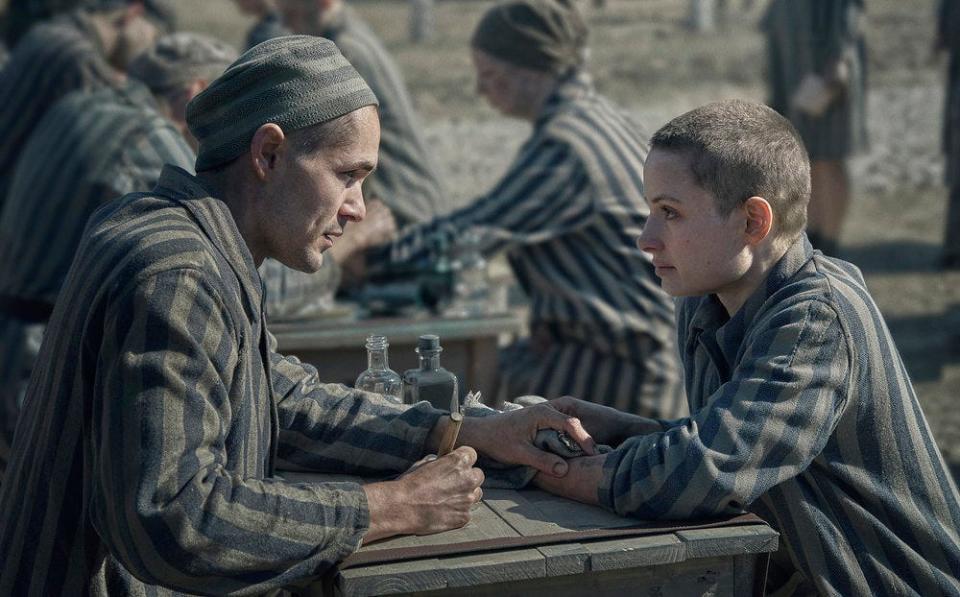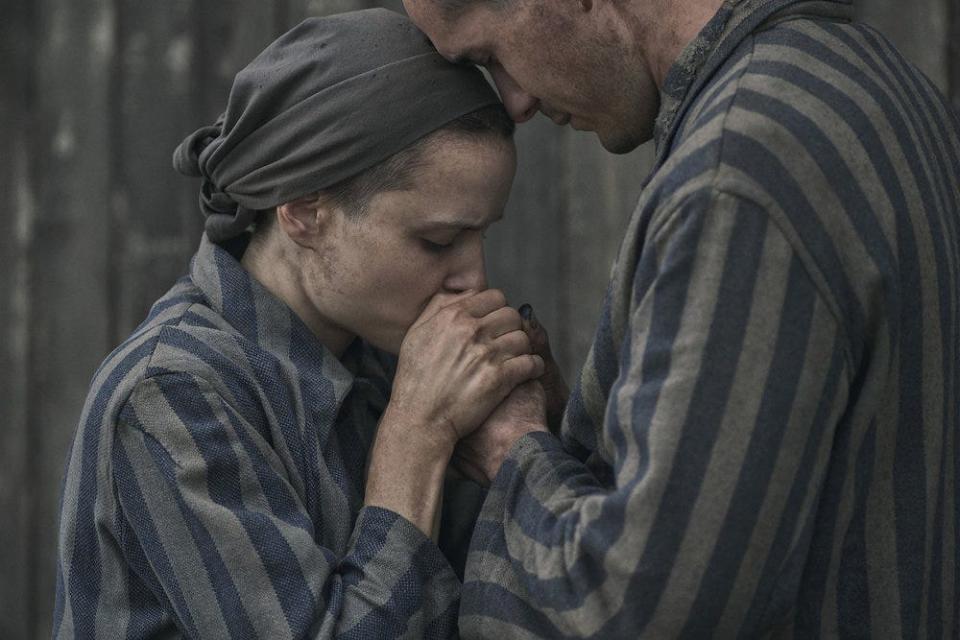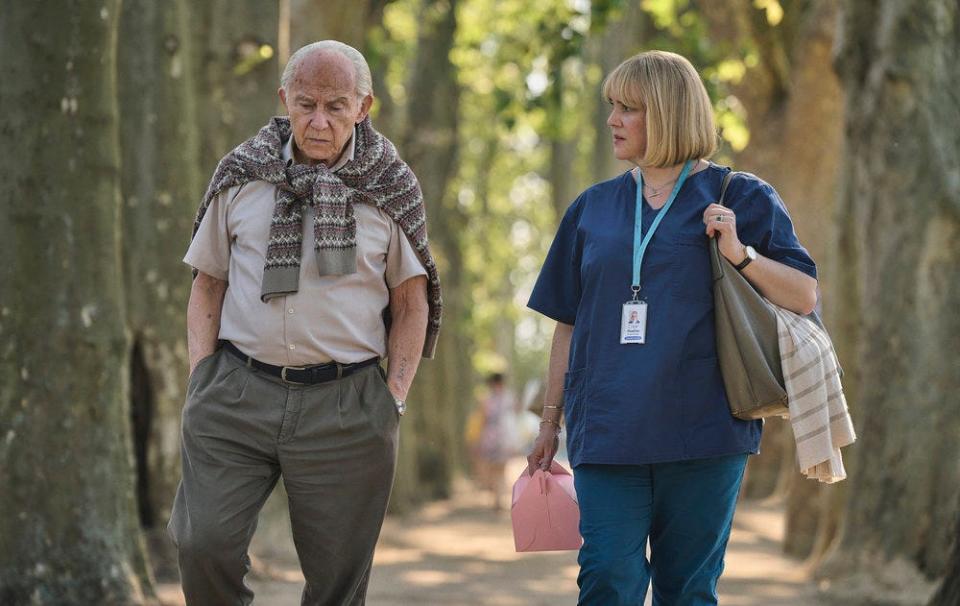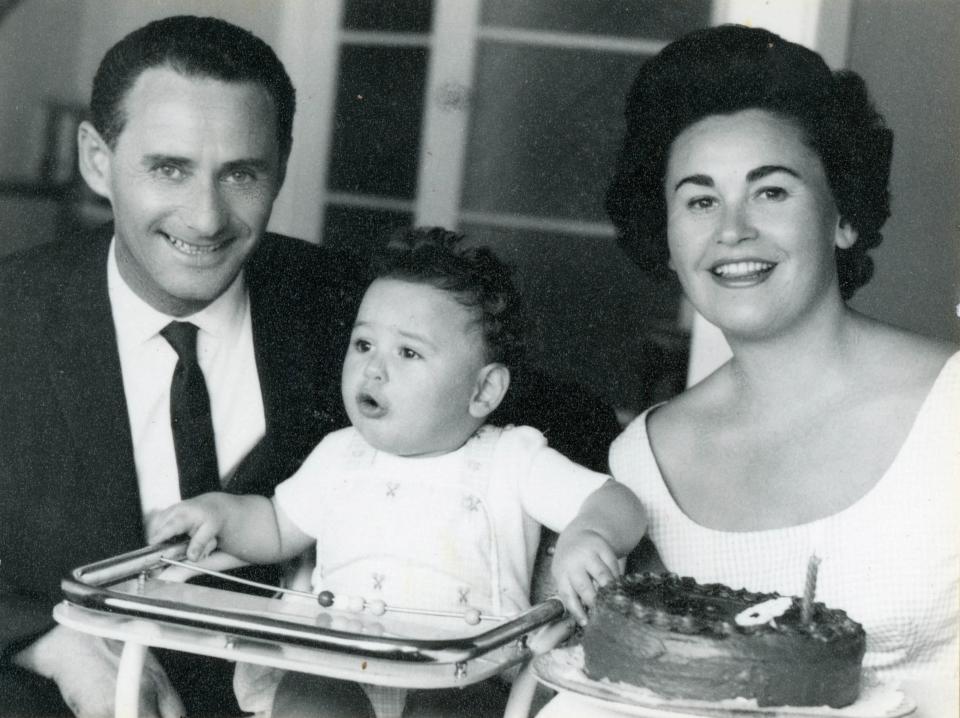'Tattooist of Auschwitz': The 'implausible' true love story behind the Holocaust TV drama
Spoiler alert! The following story contains major plot details about the Peacock miniseries “The Tattooist of Auschwitz” (now streaming).
In 1942, a young Slovakian Jewish man named Lali Sokolov was deported to Auschwitz concentration camp, where he was assigned a job inking numbers on prisoners’ arms.
One day, he struck up a conversation with a woman he was tattooing named Gita Furman. It was the beginning of a 60-year romance marked by unspeakable horrors and pain but rooted in deep love and resilience. Their story was eventually told in Heather Morris’ 2018 book “The Tattooist of Auschwitz,” which has now been adapted into a gut-wrenching TV series on Peacock.
“It felt so unique and surprising and implausible. It’s not a story we’re used to hearing,” says Jonah Hauer-King ("The Little Mermaid"), who plays Lali in the six-episode drama. “Allowing yourself to open your heart and love someone in a place like that felt very brave, almost like an act of resistance.”
'They're the definition of soulmates'

The show recounts their clandestine courtship while imprisoned at Auschwitz, where an estimated 1.1 million people were killed. Lali, who was granted special privileges as a tattooist, would smuggle letters and extra rations to Gita (Anna Próchniak). On Sundays, when neither was forced to work, they met secretly in Lali’s private sleeping quarters.
Screening the series earlier this year, “the intimate scenes were hard for people to believe, like, ‘Really? They made love in Auschwitz?’” director Tali Shalom Ezer says. “That’s something people thought we dramatized for this, but from our research and from Heather, it really happened.”
Morris, a first-time author, was introduced through mutual friends to Sokolov, who emigrated to Australia after World War II. She spent three years listening and speaking to him as he told his story. Although the book became a bestseller, "Tattooist" drew criticism from some Holocaust historians upon its release over inaccuracies.
“We’re very clearly telling a story from one person’s point of view,” clarifies executive producer Claire Mundell, noting that Sokolov recalled his memories of Auschwitz to Morris more than six decades after the fact.
'We Were the Lucky Ones': WWII and Holocaust dramas are more important than ever

Nevertheless, the “Tattooist” team worked with historical and cultural consultants to ensure their depiction was as factual as possible. For instance, while the book suggests Lali was the lone tattooist at Auschwitz, the series makes clear that he was one of several working at the camp. When Gita falls ill with typhoid fever, Lali helps find medicine for her that was available at the time (not the penicillin described in the book, which wasn’t widely accessible until after the war).
Perhaps more than anything, Ezer hopes viewers recognize the couple's courage and compassion, as well as the unique ways they supported each other: Lali, who was sensitive yet resourceful; and Gita, a headstrong force of nature.
“They’re the definition of soulmates,” Ezer says. “When Lali was losing hope, Gita gave him hope. And when she was very near to giving up, he was holding the strength to keep going. There is something about the match that is magical.”
'How could we possibly know how we would act?'

“Tattooist” toggles between the 1940s and early 2000s, as an older Lali (Harvey Keitel) shares his story with Heather (Melanie Lynskey). The series presents a nuanced look at the immense survivor's guilt Lali felt: While at Auschwitz, he was ostracized by some of his fellow prisoners, who considered his forced labor as working for the Nazis. But for Lali, his elevated status allowed him to sneak other inmates food and water.
“There’s a tension in it,” Hauer-King says. “On some level, he’s benefiting from that role: He’s given more rations and has his own place to sleep. But when it comes to profound evil, the temptation sometimes is to see heroes and villains.”
Instead, he says, we should recognize that Lali and “other victims of this horror were put in these impossible positions. How could we possibly know how we would act? Ultimately, Lali was anchored by this belief that while he was alive, he could help others.”
Sokolov regularly met with Morris until his death in 2006 at age 90. “My impression is that the time they spent together was incredibly difficult and challenging, but it was also very cathartic,” Hauer-King says. “So many survivors are unwilling or unable to talk about their experiences because it’s too painful, so I would really like to think in sharing his story he found some peace.”
'They celebrated life'

In 1945, as the Germans were losing the war, the lovers were separated when Gita was sent on a death march. Lali was transferred to the Mauthausen concentration camp in Austria but eventually escaped. He made his way back to Slovakia and waited two weeks at a train station for returning survivors, holding out hope that he would one day spot Gita there. Sure enough, they miraculously reunited and married later that year.
“It’s unimaginable,” Ezer says. “It’s just incredible that’s how it happened.”
After relocating to Melbourne in 1948, the couple developed a successful textile business and had one son, Gary. They had many friends and a beautiful apartment and enjoyed a long and happy marriage until Gita’s death in 2003.
“They celebrated life,” Mundell says. “They had others they spoke with who had experienced the same trauma, but one of the many things that’s so inspiring about them is that they got on with life. When you see photographs of them as a young couple after the war, or in the later years of their marriage, they’re just so together.
“Lali had an expression Heather told us about, which was, ‘If you wake up in the morning, it’s a good day.' He carried that with him for the rest of his life.”
This article originally appeared on USA TODAY: 'Tattooist of Auschwitz': The surprising true story behind the series

